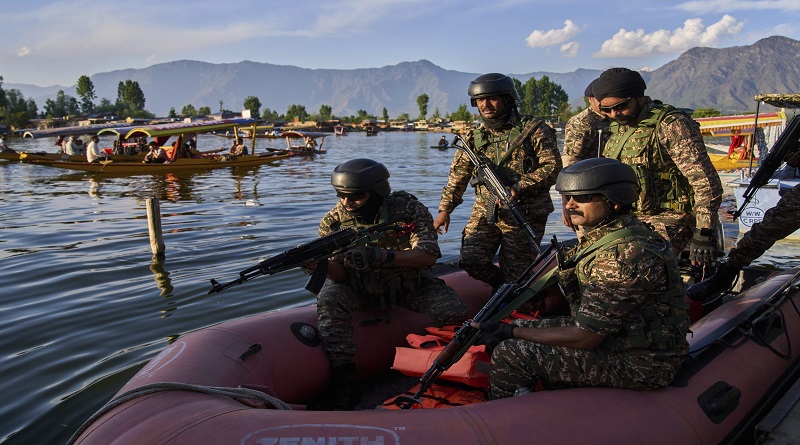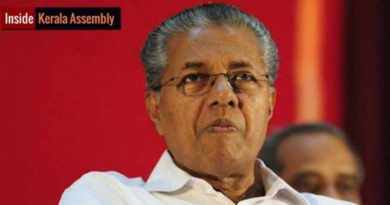Indian Military Says Pakistani Troops Opened Fire Along Kashmir Border Amid Rising Tensions

India-Pakistan Tensions Escalate After Deadly Kashmir Attack and Cross-Border Fire
Srinagar/New Delhi – April 26, 2025 —
Tensions between India and Pakistan have sharply escalated after Indian and Pakistani troops exchanged fire for two consecutive nights along the Line of Control (LoC) in the disputed Kashmir region, prompting international concern over the possibility of a wider military confrontation.
The exchange of gunfire follows a deadly attack earlier this week in Pahalgam, a town in Indian-administered Kashmir, which left 26 people dead—many of them Indian tourists. India has blamed the assault on Pakistan-backed militants, a charge Islamabad has strongly denied. Pakistan’s Prime Minister Shehbaz Sharif said his country is ready to defend its sovereignty but remains open to a “neutral” international investigation into the incident.
According to Indian defence officials, Pakistani troops resorted to “unprovoked firing” on the night of April 25 and 26 from various posts across the LoC in the Kashmir Valley. “Indian troops responded appropriately with small arms,” the officials said. The confrontation marked the second consecutive night of hostilities, suggesting a sharp breakdown of the 2021 ceasefire agreement that had held relatively firm in recent years.
“The situation is tense. This is not just a ceasefire violation—it’s a message,” said a senior Indian military official, speaking on condition of anonymity. Troops have been put on high alert across the border regions, and additional deployments are being made.
The United Nations has called for “maximum restraint” from both nuclear-armed nations, warning that continued skirmishes could spiral into a broader military conflict. “We urge both parties to refrain from actions that further escalate the situation,” said Stéphane Dujarric, spokesperson for UN Secretary-General António Guterres.
Back in Kashmir, Indian security forces have launched a large-scale search operation in and around Pahalgam, combing through homes and nearby forests in search of militants. India’s Army Chief General Manoj Pande visited the region on Friday to assess the ground situation and review counterinsurgency strategies.
In a significant diplomatic move, India has suspended its participation in the 1960 Indus Waters Treaty, a crucial agreement that governs water sharing from rivers flowing from India into Pakistan. “We will ensure not a single drop of water meant for India goes to Pakistan,” an Indian government official said.
Meanwhile, Pakistan responded by closing its airspace to Indian airlines, suspending bilateral trade, and halting the issuance of visas to Indian nationals. The steps mark a severe downturn in relations that were already fraught with historical mistrust and unresolved territorial disputes.
The region of Kashmir has remained a flashpoint between the two countries since their independence in 1947, with both nations claiming it in full but administering separate parts. While the area has seen periods of relative calm, this week’s developments have reignited fears of a renewed conflict.
Analysts warn that unless diplomatic dialogue resumes quickly, the current escalation could have far-reaching consequences. “This is a critical moment,” said geopolitical expert Dr. Naila Ahmed. “One misstep could trigger a much larger crisis.”
As of Saturday evening, no casualties have been reported in the recent border skirmishes. However, with tensions high and both armies on edge, the situation remains fluid and volatile.






И немедленно же он обращал к небу горькие укоризны за то, что оно не наградило его при рождении литературным талантом, без чего, естественно, нечего было и мечтать овладеть членским МАССОЛИТским билетом, коричневым, пахнущим дорогой кожей, с золотой широкой каймой, – известным всей Москве билетом. раскрутка сайта самостоятельно – А что есть? – спросил Берлиоз.
В психиатрическую. Webbankir Сегодняшний вечер мне известен более или менее точно.
Поэт не глядел уже по сторонам, а, уставившись в грязный трясущийся пол, стал что-то бормотать, ныть, глодая самого себя. разработка веб систем Пилат напрягся, изгнал видение, вернулся взором на балкон, и опять перед ним оказались глаза арестанта.
Загадочный профессор брезгливо скривил и без того кривой рот и пожал плечами. Ремонт пластиковых окон Улица Скобелевская А то выходит по твоему рассказу, что он действительно родился!.
– Проговорив это, командир скомандовал точно, ясно, быстро: – Пантелея из буфетной. апостиль где поставить Вот какое дело… гм… гм… у меня сидит этот… э… артист Воланд… Так вот… я хотел спросить, как насчет сегодняшнего вечера?.
Отношения таким образом были восстановлены, и все трое вновь сели на скамью. нотариус Москалев И статья, между нами говоря, дурацкая! И никчемная, и деньги-то маленькие… Немедленно вслед за воспоминанием о статье прилетело воспоминание о каком-то сомнительном разговоре, происходившем, как помнится, двадцать четвертого апреля вечером тут же, в столовой, когда Степа ужинал с Михаилом Александровичем.
По дороге он крикнул в направлении кухни: – Груня! Но никто не отозвался. Кронштейны зеркала кабины Вот теперь стоящие у останков покойного совещались, как лучше сделать: пришить ли отрезанную голову к шее или выставить тело в грибоедовском зале, просто закрыв погибшего наглухо до подбородка черным платком? Да, Михаил Александрович никуда не мог позвонить, и совершенно напрасно возмущались и кричали Денискин, Глухарев и Квант с Бескудниковым.
Одинокий, хриплый крик Ивана хороших результатов не принес. сколько ремонт трехкомнатной квартиры – Да, да, да, – возбужденно говорил Берлиоз, – впрочем, все это возможно! Даже очень возможно, и Понтий Пилат, и балкон, и тому подобное.
А вы одни приехали или с супругой? – Один, один, я всегда один, – горько ответил профессор. нотариально заверенный перевод документов – Ванна, сто семнадцатую отдельную и пост к нему, – распорядился врач, надевая очки.
Стрелка ползла к одиннадцати. самостоятельно продвинуть сайт яндексе Все окна были открыты.
– Ага, – сказал врач, – а почему так спешили? Какое-нибудь деловое свидание? – Консультанта я ловлю, – ответил Иван Николаевич и тревожно оглянулся. создание сайта на wordpress стоимость Но ввиду того, что безумные, утопические речи Га-Ноцри могут быть причиною волнений в Ершалаиме, прокуратор удаляет Иешуа из Ершалаима и подвергает его заключению в Кесарии Стратоновой на Средиземном море, то есть именно там, где резиденция прокуратора.
Кстати, ты знаешь такого, первосвященник? Да… если бы такой проник сюда, он горько пожалел бы себя, в этом ты мне, конечно, поверишь? Так знай же, что не будет тебе, первосвященник, отныне покоя! Ни тебе, ни народу твоему, – и Пилат указал вдаль направо, туда, где в высоте пылал храм, – это я тебе говорю – Пилат Понтийский, всадник Золотое Копье! – Знаю, знаю! – бесстрашно ответил чернобородый Каифа, и глаза его сверкнули. бюро переводов с нотариальным – Слишком много ты жаловался кесарю на меня, и настал теперь мой час, Каифа! Теперь полетит весть от меня, да не наместнику в Антиохию и не в Рим, а прямо на Капрею, самому императору, весть о том, как вы заведомых мятежников в Ершалаиме прячете от смерти.
– Левий Матвей? – хриплым голосом спросил больной и закрыл глаза. переводы документов с нотариальным заверением в железнодорожном Безобразие! – вдруг завопил Иван и швырнул трубку в стену.
– Браво! – вскричал иностранец. сколько стоит нотариальный перевод украинского паспорта Не зная, как поступают в таких случаях, Степа поднялся на трясущиеся ноги и пошел по молу к берегу.
Я предупредил, а там как хотите! Меня же сейчас более всего интересует Понтий Пилат… Пилат… – тут он закрыл глаза. мфо езаем отзывы Растерявшийся Иван послушался шуткаря-регента и крикнул: «Караул!», а регент его надул, ничего не крикнул.
Но, говоря, взвешивай каждое слово, если не хочешь не только неизбежной, но и мучительной смерти. chery amulet корпус воздушного фильтра Объяснимся: Степа Лиходеев, директор театра Варьете, очнулся утром у себя в той самой квартире, которую он занимал пополам с покойным Берлиозом, в большом шестиэтажном доме, покоем расположенном на Садовой улице.
На первом – обнаженное, в засохшей крови, тело с перебитой рукой и раздавленной грудной клеткой, на другом – голова с выбитыми передними зубами, с помутневшими открытыми глазами, которые не пугал резчайший свет, а на третьем груда заскорузлых тряпок. замена воздушного фильтра nissan qashqai 2 И все, кроме неподвижного прокуратора, проводили взглядом Марка Крысобоя, который махнул рукой арестованному, показывая, что тот должен следовать за ним.
– Ах, как интересно! – воскликнул иностранец. просрочка езаем отзывы Быть может, ей пришла мысль вить там гнездо.
Имейте в виду, что на это существует седьмое доказательство, и уж самое надежное! И вам оно сейчас будет предъявлено. яндекс мигкредит личный кабинет – Но, – продолжал иноземец, не смущаясь изумлением Берлиоза и обращаясь к поэту, – отправить его в Соловки невозможно по той причине, что он уже с лишком сто лет пребывает в местах значительно более отдаленных, чем Соловки, и извлечь его оттуда никоим образом нельзя, уверяю вас! – А жаль! – отозвался задира-поэт.
Она почувствовала себя обманутой. ремонт окон регулировка москва Она поднесла его к лицу девчонки: – Смотри в дырочку.
— Я тебе сказку расскажу, — заговорила Маргарита и положила разгоряченную руку на стриженную голову, — была на свете одна тетя. нестандартная москитная сетка на пластиковые окна Воланд, по своему обыкновению, находился в спальне, а где был кот — неизвестно.
– Отпускай ногу, Яр, снимай жгут. москитные сетки на пластиковые окна цены в ростове Как только вышли за ограду, все без шуму и разговоров, равномерно и спокойно растянулись по дороге и полю, ведшими к отрадненскому лесу.
Маргарита взвизгнула от восторга и вскочила на щетку верхом. москитные двери сетки на пластиковые окна цена Через минуту все стояли около столпившихся собак.
Несколько минут слышалось только посвистывание воздуха снаружи, затем волшебница вернулась к спутникам: – Олен занят, просил до темноты не беспокоить. держатели москитных сеток на пластиковые окна А когда прозвучало, что некий Лен служил Аполлону, он не выдержал: – Вы слышали? Нарада был, был! Я не вру! Аполлон, это Опалун, а Лен – это Тринс! Едем, я покажу, где выбил своё имя и рисунок сделал.
А они вспоминали те события часа два. Ну, кому нужен точильщик в нашем доме? Что точить? Какие ножи? Она входила в калитку один раз, а биений сердца до этого я испытывал не менее десяти. Николай Иванович не очень удивил следствие, выложив на стол шутовское удостоверение о том, что он провел время на балу у сатаны.
Маргарита вскоре увидела его. Срочно Деньги Заявка На Займ Карту Онлайн – Зачем люди летят внутри него и все вместе? – Ну, они потом приземлятся и поедут по своим делам, в разные стороны.
– Да фиг с ним, с фонарём! Кто бы возражал, – друг отмахнулся, а в спину Олена крикнул. Секс Знакомства Без Регистрации Качканар К голосу курьера присоединились дальние голоса, хор начал разрастаться, и, наконец, песня загремела во всех углах филиала.